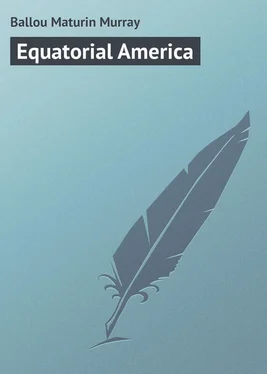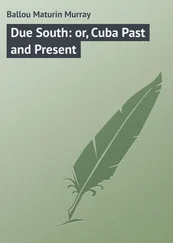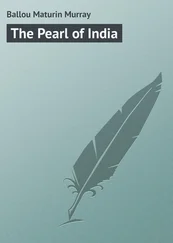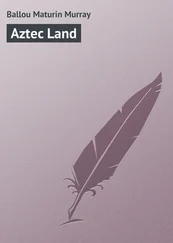Maturin Ballou - Equatorial America
Здесь есть возможность читать онлайн «Maturin Ballou - Equatorial America» — ознакомительный отрывок электронной книги совершенно бесплатно, а после прочтения отрывка купить полную версию. В некоторых случаях можно слушать аудио, скачать через торрент в формате fb2 и присутствует краткое содержание. Жанр: foreign_language, foreign_prose, Путешествия и география, на английском языке. Описание произведения, (предисловие) а так же отзывы посетителей доступны на портале библиотеки ЛибКат.
- Название:Equatorial America
- Автор:
- Жанр:
- Год:неизвестен
- ISBN:нет данных
- Рейтинг книги:4 / 5. Голосов: 1
-
Избранное:Добавить в избранное
- Отзывы:
-
Ваша оценка:
- 80
- 1
- 2
- 3
- 4
- 5
Equatorial America: краткое содержание, описание и аннотация
Предлагаем к чтению аннотацию, описание, краткое содержание или предисловие (зависит от того, что написал сам автор книги «Equatorial America»). Если вы не нашли необходимую информацию о книге — напишите в комментариях, мы постараемся отыскать её.
Equatorial America — читать онлайн ознакомительный отрывок
Ниже представлен текст книги, разбитый по страницам. Система сохранения места последней прочитанной страницы, позволяет с удобством читать онлайн бесплатно книгу «Equatorial America», без необходимости каждый раз заново искать на чём Вы остановились. Поставьте закладку, и сможете в любой момент перейти на страницу, на которой закончили чтение.
Интервал:
Закладка:
We were cautioned to look out for and to avoid a certain poisonous snake, a malignant reptile, with fatal fangs, which is the dread of the inhabitants, some of whom are said to die every year from the venom of the creature. It will be remembered that one of these snakes, known here as the fer-de-lance , bit Josephine, the future empress, when she was very young, and that her faithful negro nurse saved the child's life by instantly drawing the poison from the wound with her own lips. It is singular that this island, and that of St. Lucia, directly south of it, should be cursed by the presence of these poisonous creatures, which do not exist in any other of the West Indian islands, and, indeed, so far as we know, are not to be found anywhere else. The fer-de-lance has one fatal enemy. This is a large snake, harmless so far as poisonous fangs are concerned, called the cribo . This reptile fearlessly attacks the fer-de-lance, and kills and eats him in spite of his venom, a perfectly justifiable if not gratifying instance of cannibalism, where a creature eats and relishes the body of one of its own species. The domestic cat is said also to be more than a match for the dreaded snake, and instinctively adopts a style of attack which, while protecting itself, finally closes the contest by the death of the fer-de-lance, which it seizes just back of the head at the spine, and does not let go until it has severed the head from the body; and even then instinct teaches the cat to avoid the head, for though it be severed from the body, like the mouth of a turtle under similar circumstances, it can still inflict a serious wound.
The fer-de-lance is a great destroyer of rats, this rodent forming its principal source of food. Now as rats are almost as much of a pest upon the island, and especially on the sugar plantations, as rabbits are in New Zealand, it will be seen that even the existence of this poisonous snake is not an unmitigated evil.
Crosses and wayside shrines of a very humble character are to be seen in all directions on the roadsides leading from St. Pierre, recalling similar structures which line the inland roads of Japan, where the local religion finds like public expression, only varying in the character of the emblems. At Martinique it is a Christ or a Madonna; in Japan it is a crude idol of some sort, the more hideous, the more appropriate. The same idea is to be seen carried out in the streets of Canton and Shanghai, only Chinese idols are a degree more unlike anything upon or below the earth than they are elsewhere.
It was observed that while there were plenty of masculine loafers and careless idlers of various colors, whose whole occupation seemed to be sucking at some form of burning tobacco in the shape of cigarette, cigar, or pipe, the women, of whatever complexion, seen in public, were all usefully employed. They are industrious by instinct; one almost never sees them in repose. In the transportation of all articles of domestic use, women bear them upon their heads, whether the article weighs one pound or fifty, balancing their load without making use of the hands except to place the article in position. The women not infrequently have also a baby upon their backs at the same time. Negresses and donkeys perform nine tenths of the transportation of merchandise. Wheeled vehicles are very little used in the West Indian islands. As we have seen, even in coaling ship, it is the women who do the work.
The Hotel des Bains, at St. Pierre, is an excellent hostelry, as such places go in this part of the world. The stranger will find here most of the requisites for domestic comfort, and at reasonable prices. As a health resort the place has its advantages, and a northern invalid, wishing to escape the rigor of a New England winter, would doubtless find much to occupy and recuperate him here. St. Pierre, however, has times of serious epidemic sickness, though this does not often happen in the winter season. Three or four years ago the island was visited by a sweeping epidemic of small-pox, but it raged almost entirely among the lowest classes, principally among the negroes, who seem to have a great prejudice and superstitious fear relating to vaccination, and its employment as a preventive against contracting the disease. In the yellow fever season the city suffers more or less, but the health of St. Pierre will average as good as that of our extreme Southern States; and yet, after all, with the earthquakes, hurricanes, tarantulas, scorpions, and deadly fer-de-lance, as Artemus Ward would say, Martinique presents many characteristics to recommend protracted absence. A brief visit is like a poem to be remembered, but one soon gets a surfeit of the circumscribed island.
Our next objective point was Barbadoes, to reach which we sailed one hundred and fifty miles to the eastward, this most important of the Lesser Antilles being situated further to windward, that is, nearer the continent of Europe. Our ponderous anchor came up at early morning, just as the sun rose out of the long, level reach of waters. It looked like a mammoth ball of fire, which had been immersed during the hours of the night countless fathoms below the sea. Presently everything was aglow with light and warmth, while the atmosphere seemed full of infinitesimal particles of glittering gold. At first one could watch the face of the rising sun, as it came peering above the sea, a sort of fascination impelling the observer to do so, but after a few moments, no human eye could bear its dazzling splendor.
Said an honest old Marshfield farmer, in 1776, who met the clergyman of the village very early in the opening day: "Ah, good mornin', Parson, another fine day," nodding significantly towards the sun just appearing above the cloudless horizon of Massachusetts Bay. "They do say the airth moves, and the sun stands still; but you and I, Parson, we git up airly and we see it rise!"
CHAPTER III
English Island of Barbadoes. – Bridgetown the Capital. – The Manufacture of Rum. – A Geographical Expert. – Very English. – A Pest of Ants. – Exports. – The Ice House. – A Dense Population. – Educational. – Marine Hotel. – Habits of Gambling. – Hurricanes. – Curious Antiquities. – The Barbadoes Leg. – Wakeful Dreams. – Absence of Twilight. – Departure from the Island.
Bridgetown is the capital of Barbadoes, an English island which, unlike St. Thomas, is a highly cultivated sugar plantation from shore to shore. In natural beauty, however, it will not compare with Martinique. It is by no means picturesquely beautiful, like most of the West Indian islands, being quite devoid of their thick tropical verdure. Nature is here absolutely beaten out of the field by excessive cultivation. Thirty thousand acres of sugar-cane are cut annually, yielding, according to late statistics, about seventy thousand hogsheads of sugar. We are sorry to add that there are twenty-three rum distilleries on the island, which do pecuniarily a thriving business. "The poorest molasses makes the best rum," said an experienced manager to us. He might well have added that it is also the poorest use to which it could be put. This spirit, like all produced in the West Indies, is called Jamaica rum, and though a certain amount of it is still shipped to the coast of Africa, the return cargoes no longer consist of kidnapped negroes. The article known as New England rum, still manufactured in the neighborhood of Boston, has always disputed the African market, so to speak, with the product of these islands. Rum is the bane of Africa, just as opium is of China, the former thrust upon the native races by Americans, the latter upon the Chinese by English merchants, backed by the British government. Events follow each other so swiftly in modern times as to become half forgotten by contemporary people, but there are those among us who remember when China as a nation tried to stop the importation of the deadly drug yielded by the poppy fields of India, whereupon England forced the article upon her at the point of the bayonet.
Читать дальшеИнтервал:
Закладка:
Похожие книги на «Equatorial America»
Представляем Вашему вниманию похожие книги на «Equatorial America» списком для выбора. Мы отобрали схожую по названию и смыслу литературу в надежде предоставить читателям больше вариантов отыскать новые, интересные, ещё непрочитанные произведения.
Обсуждение, отзывы о книге «Equatorial America» и просто собственные мнения читателей. Оставьте ваши комментарии, напишите, что Вы думаете о произведении, его смысле или главных героях. Укажите что конкретно понравилось, а что нет, и почему Вы так считаете.












